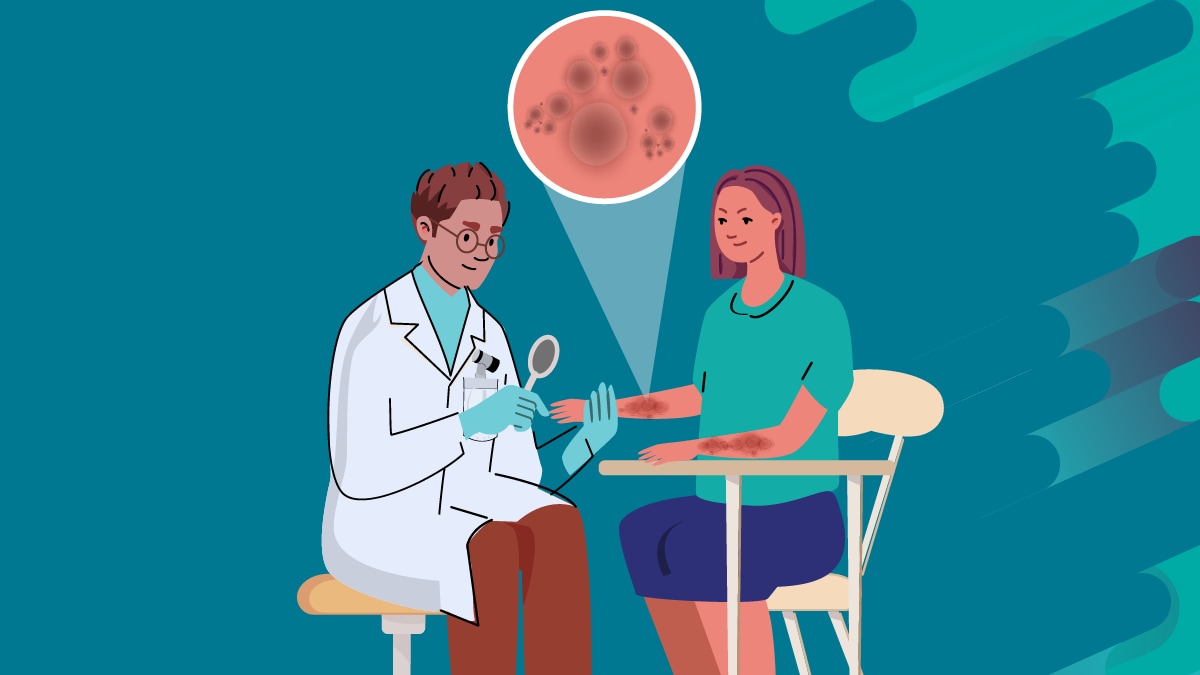About
- In recent years, emerging (new) types of ringworm have been spreading.
- These infections tend to be more severe and more difficult to treat.
- Severe antimicrobial-resistant ringworm, currently most common in South Asia, is being reported in other parts of the world including the United States.
- Another type of severe ringworm linked to intimate or sexual contact has been emerging in Europe and some cases have been reported in the United States.

Overview
Ringworm is typically a mild fungal infection that can affect the skin, hair, or nails. Emerging (new) types of ringworm cause more severe and difficult to treat infections with some differences from common ringworm.
Some emerging types are resistant to the antifungal medications that typically treat ringworm. More recently, there have been reports of ringworm that is linked to sexual contact.
Antimicrobial resistance
Most of the time, common ringworm goes away after a few weeks of over-the-counter (non-prescription) antifungal treatment. Some emerging types of ringworm are resistant to, or unable to be treated with, the typical antifungal treatments. These infections also tend to be more severe. Treating antimicrobial-resistant infections requires prescription medication, taken by mouth, often for several months.
Travel to some areas may put you at higher risk for antimicrobial-resistant ringworm. Antimicrobial-resistant ringworm is more common in some regions, such as South Asia. Both domestic and travel-related cases have been reported in the United States.
The specific types (species) of fungi causing ringworm that have shown concerning antimicrobial resistance are Trichophyton indotineae and Trichophyton rubrum.

Spread through sexual contact
Ringworm spreads easily through skin-to-skin contact. In recent years, infections linked to intimate or sexual contact (sexual transmission) have been reported in Southeast Asia, Europe, and the United States.
Emerging sexually transmitted ringworm affects parts of the body involved with sexual contact and can cause more severe infections. They can be harder to treat than common ringworm. Treatment may require antifungal medication by mouth for several weeks or months.
The specific type (species) of ringworm that has been most linked to sexual transmission is Trichophyton mentagrophytes genotype VII (TMVII). TMVII infections are usually not antimicrobial-resistant but typically require treatment with oral medication, often for several months.
What to look out for
Emerging types of ringworm often cause more severe infections than common ringworm.
Severe ringworm causes larger red (brown or gray on darker skin), scaly, itchy rash spreading over sections of the body. It can also cause pus-filled bumps and hair loss in the scalp or beard area.
Ringworm infections associated with intimate or sexual contact affect areas where sexual contact occurs. Examples include genitals (shaft of the penis or folds of skin around the vaginal opening), buttocks, groin, or face, in addition to skin on the trunk, arms, or legs.
Prevention tips
The same steps to prevent the spread of ringworm reduce risk for emerging ringworm. Examples include keeping skin clean and dry, and wearing sandals in public locker rooms.

Avoid skin-to-skin contact, including intimate or sexual contact, with anyone with known or suspected ringworm. Avoid sharing personal items such as bedding, towels and clothing until the rash resolves.
Be aware of any new, unexplained rashes, especially during or after travel or after sexual contact with a new partner. Talk with your partner about your concerns and how to prevent sexually transmitted infections.
What to do if you think you have ringworm
If you have a rash that you suspect is ringworm, avoid skin-to-skin contact, including sexual contact, until the rash is gone.
Avoid using over-the-counter and prescription steroid creams, including antifungal creams that contain steroids. Steroid creams can make the infection worse and may lead to antimicrobial resistance.
If you use an over-the-counter antifungal treatment for over two weeks and symptoms do not improve, see a healthcare provider. Tell your healthcare provider if you have recently traveled.
If you are diagnosed with ringworm that may have been acquired through sexual contact, consider:
- Notifying your sexual partner(s).
- Getting tested for other sexually transmitted infections.
